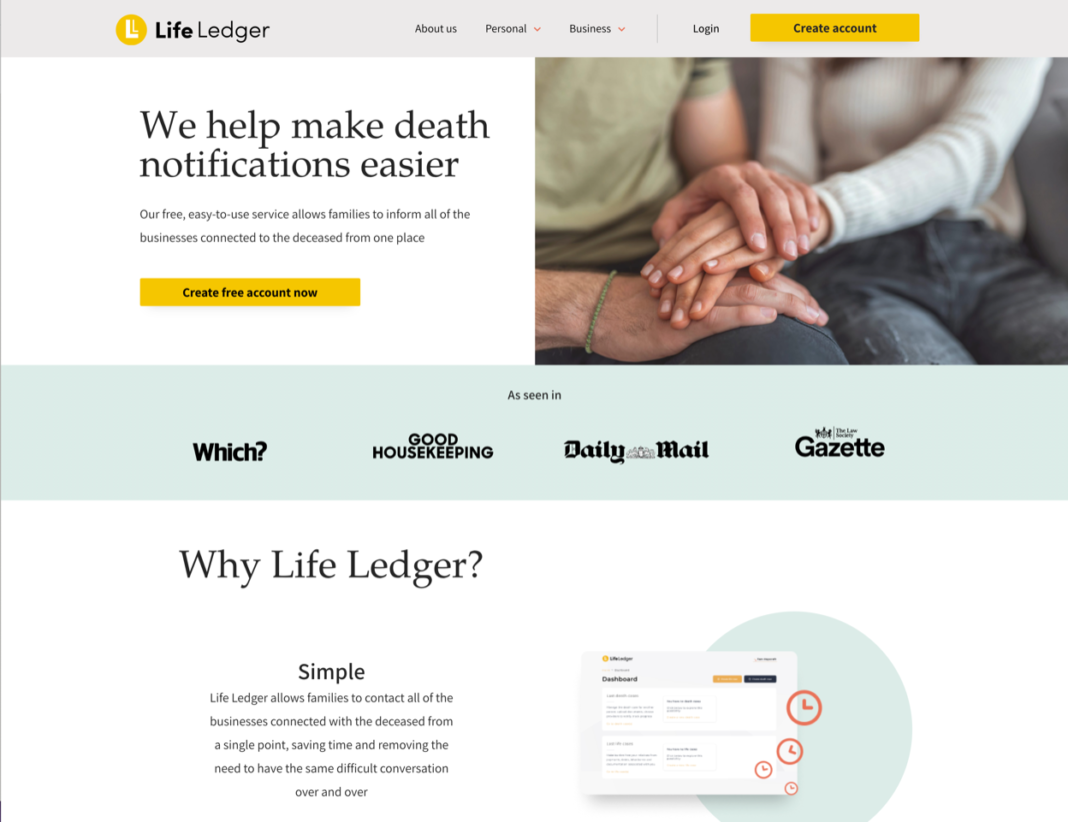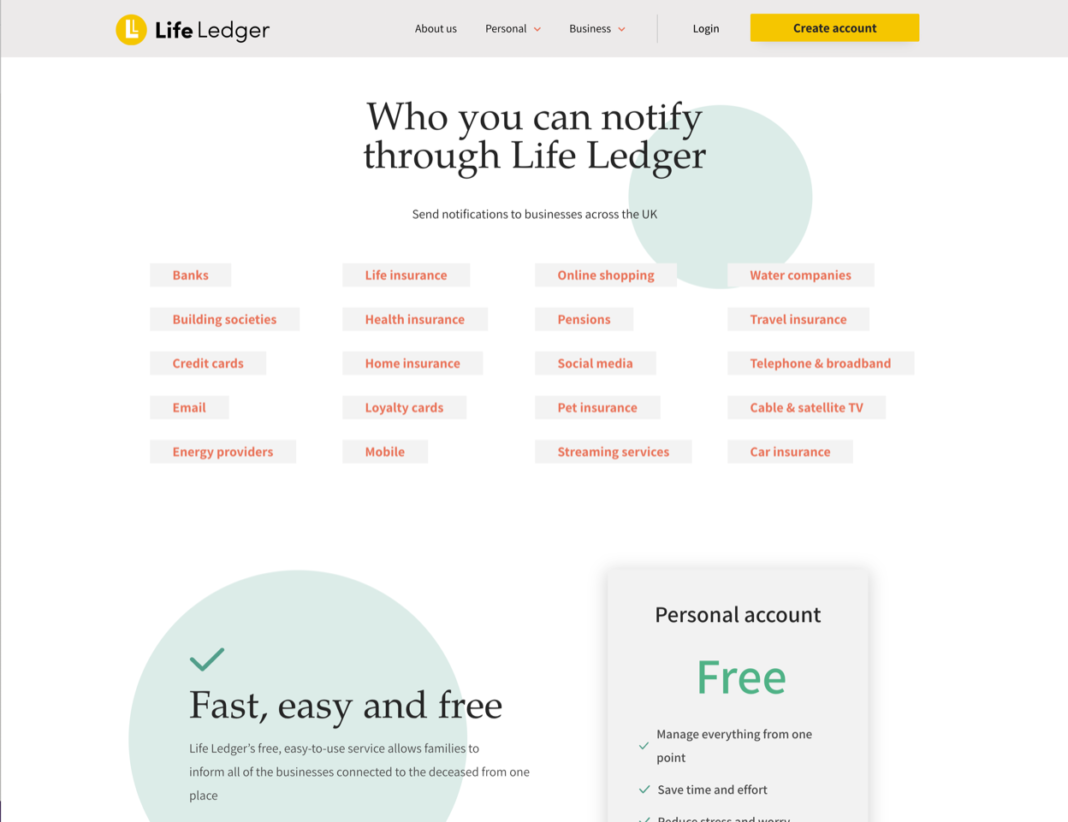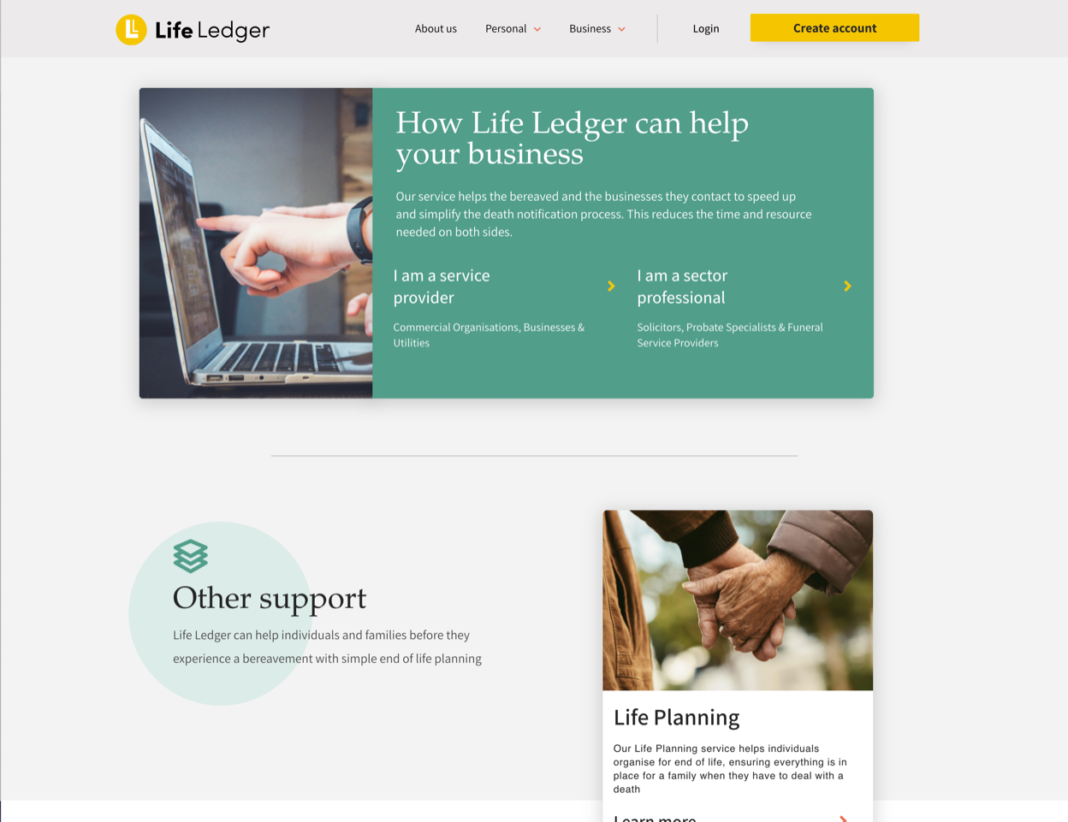When a loved one dies, there are so many suppliers and authorities to notify. It can feel quite overwhelming and it’s easy to worry that there’s somebody important you’ve forgotten to tell.
After Ruth Blakemore’s painful first-hand experience of trying to close her mother’s accounts, she and close friend Tremayne Carew Pole set about trying to create a simple solution to the complicated process of sending death notifications to all the companies and organisations that needed them. And they succeeded.
Launched at the end of 2020, Life Ledger is a free, secure, easy-to-use service that simplifies the process of death notifications.
The service helps to streamline and simplify the death notification process by requesting details only once. It enables you to inform the following types of companies all in one go:
- Banks, building societies, and credit card providers
- Pension companies
- Utility suppliers – Energy and water companies
- Insurance companies – home, car, life, health, travel, and pet
- Media companies – Internet providers, cable, satellite, and streaming services
- Communications – Email account providers, landline and mobile phone companies
- Social media accounts – Twitter, Facebook, Instagram, etc.
- Shopping – Loyalty cards, and online shopping accounts
How it started
Informing businesses of a loved one’s death can be a slow, disjointed, and highly repetitive process and it has to be performed at an incredibly difficult time.
When Ruth’s mum died, she realised she was having to share 90 to 95% of the same information with each business she spoke to.
Despite excellent first-hand knowledge of the corporate machine, the complexity and barriers forced Ruth to give up after a year of trying. It was at that point she and Tremayne Carew Pole put their heads together to try and find a better way.
Their initial focus was on government and attempting to drive change from the top. But after knocking on door after door with no results, they realised the only way forward was to create a solution of their own, and Life Ledger was born.
At the beginning of 2019 Ruth stepped into an advisory role and Nicky Hector, who had watched her mum struggle with the results of her grandmother’s death, stepped out of Ocado to help lead Life Ledger from idea to reality. Two years later Life Ledger was launched.
“When my dad died, I had to notify various companies and ask for bills to be swapped into my mum’s name. It was painful to spend hour after hour telling strangers that my lovely dad had died. I wish I’d known about Life Ledger so I could have got everything done in one go.” Angie (recently bereaved)
How does Life Ledger work?
When you ‘Register a Death’, you register yourself, the person who has died, and identify which accounts need to be switched to a surviving partner. You then simply select the company you wish to notify, add the account details and press send.
The Life Ledger solution allows you to input the information once and simply press the ‘Send’ button.
In the background, the notification engine gathers the right information for each business, cross-checks data sources, biometrically verifies the person sending the notification, then securely packages and sends the data.
The service currently sends notifications to over 700 UK companies across sectors ranging from banks and pension providers to gas, water, telecoms, and social media.
There is also a ‘Register a Life’ page, which is for those conscious of their own mortality. It’s a great adjunct to the will-writing process. Your account information is stored to make the post-death notification process more streamlined.
Free to use
For the bereaved, the service is, and always will be, free of charge.
Fees are collected from professionals who use the service – solicitors, probate specialists, and independent financial advisors – who manage multiple notifications simultaneously on behalf of their clients.
Mission statement
Life Ledger is a business with a clear social purpose: to make dealing with death easier for the bereaved.
Dealing with the death of a loved one is difficult enough: making death notifications should be simple and straightforward. And now, thanks to Life Ledger, it is!
For more information, or to use the service, go to: lifeledger.com.
Tell Us Once – Government and council departments
In 2015, the UK Government launched the Tell Us Once service that lets you report a death to most government organisations in one go.
You must use the service within 28 days of getting your unique reference number from the Registrar when you register the death. (If you cannot register the death because an inquest is underway, you can still ask a registrar for a unique reference number. You’ll need to get an interim death certificate from the coroner holding the inquest first.)
The service can be used in relation to state pension, HMRC, Council Tax, bus pass, and Library card.
Arranging a funeral
While a funeral director is the professional most likely to deal with the practical arrangements of a funeral, the type of ceremony you choose is entirely up to you. Our celebrants are sensitive people, empathetic to the experience of bereavement, and focused on providing a non-religious funeral ceremony that will be most fitting for the circumstances.
They are familiar with cremation and burial procedures and will guide you through the whole process of arranging a funeral ceremony and will have ideas and suggestions about how to make it totally personal for your loved one..










